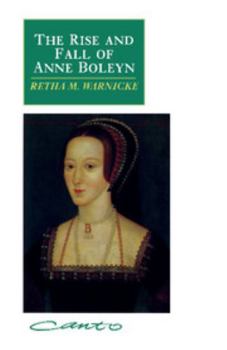The Rise and Fall of Anne Boleyn: Family Politics at the Court of Henry VIII
Select Format
Select Condition 
Book Overview
The events which led to the execution of Anne Boleyn, Henry VIII's second queen, in 1536 have traditionally been explained by historians in terms of a factional conspiracy masterminded by Henry's... This description may be from another edition of this product.
Format:Paperback
Language:English
ISBN:0521406773
ISBN13:9780521406772
Release Date:July 1991
Publisher:Cambridge University Press
Length:338 Pages
Weight:0.93 lbs.
Dimensions:0.7" x 5.4" x 8.4"
Related Subjects
Biographical Biographies Biographies & History Biography & History Elections & Political Process England Ethnic & National Europe Henry VIII History Irish Leaders & Notable People Modern (16th-21st Centuries) Political Political Science Politics & Government Politics & Social Sciences Royalty Social Sciences WesternCustomer Reviews
5 ratings
New ideas on Anne Boleyn
Published by Thriftbooks.com User , 16 years ago
Retha Warnicke is an expert on family relations in early modern society. This brings a unique perspective to the already interesting life of Anne Boleyn. By understanding not only court politics but the gender roles of time, she effectively introduces new and exciting ideas in the history of the Tudor period. It seems Warnicke would be the first to admit that she does not have a "smoking gun", no deformed fetus was ever recovered, no secret diary detailing the events ever found. However, she bases her conclusions off logical reasoning and a knowledge of the superstitions of the time. Though this book was not written as a popular history, it is readable and very informative, though you might want to do a little bit of research on the Tudors before you pick it up. I happened to like this book very much, but if you are old school and do not like to be challenged in set beliefs then do not pick this book up. Her ideas are thought provoking, scholarly and make the reader re-evaluate what they might have learned growing up. She presents a different perspective on Anne Boleyn than any other historian before and that is what makes this book scintillating and readable, even if you do not agree with everything (or anything) she writes.
New Insights
Published by Thriftbooks.com User , 24 years ago
In a clear and concise manner, Dr. Warnicke develops a new view of the complex nature of Tudor court politics. She moves beyond a surface analysis of the written records, and convincingly discusses the veracity of the accounts about Anne Boleyn and her role at court. Warnicke also infuses her work with a discussion of sixteenth-century social and cultural mores that have been lacking in other books. By placing Anne in her cultural setting, Warnicke gives the reader a more realistic portrayal of Anne, going beyond the image of the silly flirt created by other historians. It should be noted, however, that this is not a true biography of Anne and readers may be disappointed with this book if they are looking for a fuller account of Anne's life. This book is more a view of court politics and Anne's position in that system.
original and thoughtful
Published by Thriftbooks.com User , 24 years ago
This book is a highly original and thoughtful analysis of Anne Boleyn and the events that eventually led to her execution. As Warnicke herself states, this is not a traditional biography but a study of Anne in the midst of her family networks and court politics. It is especially significant in replacing the stereotype of the aggressive and manipulative Anne with a more complex woman who did what she could for herself and her family with her limited choices. Warnicke's theory that Anne's 1536 miscarriage was of a deformed fetus is especially intriguing. The book is also valuable for early sixteenth century ideas about witchcraft and sexuality. This is not necessarily an easy read but it is a most worthwhile one.
A New Look at an Old Story
Published by Thriftbooks.com User , 24 years ago
Warnicke makes a convincing argument for the downfall of Anne Boleyn. She looks at the tragedy of Anne Boleyn from another angle, instead of the typical explanation that Anne was beheaded because of factional politics or that her husband grew tired of her.What is particularly interesting and helps make Warnicke's case, is that she establishes that very few people knew about Anne's two previous miscarriages, whereas the King and Cromwell made sure to publicize her miscarriage of January 1536. Warnicke's argument is that the King and his minister must have had a reason not to hide this miscarriage. If the reader is willing to step back from what he or she may have read previously about Anne Boleyn, Warnicke's book shows that the tragedy of Anne Boleyn was not really a tragedy at all, but a 16th century response to ignorance of biology. One of the clues that points in this direction is that the King took pains to link her name with several men and on several occasions after the birth of her daughter. Henry needed to convince others these men were possibly the father's of the previous fetuses that Anne had miscarried. Warnicke explains the reasoning behind this based on Henry's response to Catherine Howard's infidelity six years later. Only one lover was necessary to convict and execute her. But in Catherine's case, Henry didn't need to prove that a miscarried fetus did not belong to him.
Great new insights on Anne Boleyn!
Published by Thriftbooks.com User , 25 years ago
I loved this book and I've read everything out there on Henry VIII and his matrimonial adventures. This book pays close attention to the court intrigues surrounding Anne Boleyn and makes a plausible case for Anne's fall as the result of political infighting as opposed to the more popular view of Henry tiring of Anne and of Anne's failure to bear a son. A must-read for any Tudor fan.






